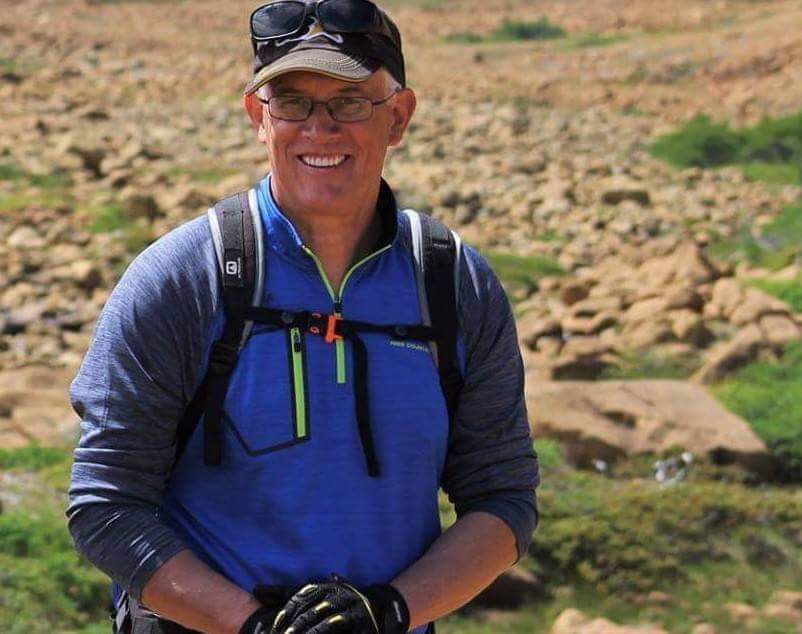An interview with Ian Robertson from My Parky Story on June 25, 2023 by George Ackerman, Ph.D, J.D.
Biography
I was diagnosed with Parkinson’s in May 2012. I was 56 years old. I have been vibrating with excitement ever since. I am a husband, a father, and a grandfather.
I live and work in Broderick Saskatchewan, Canada with my wife and caregiver, Susan.
Parkinson’s has been living with me, living with her, living with us since 2012.
Self-employed, I was an owner of a small motel, a Director and Instructor for Mind the Net Goaltending and have worked with the Saskatchewan Hockey Association, As well as doing Coaching certification courses for Hockey Canada.
I have presented and met with support groups in Alberta, Saskatchewan, Ontario, Quebec, and Iceland.
I try to face each new day of Parkinson’s with a positive attitude, a sense of humor and an open willingness to talk about it.
Please tell me a little about your background and what got you involved with awareness.
My name is Ian Robertson. I currently live in the village of Broderick. A town of Approximately 90 people in Saskatchewan, Canada. That was only a portion of the geographical part of my introduction!
I will let you do the math section. The current year is 2023. I was born in Winnipeg in 1955. Finished high school in Montreal in 1972. Married my wife Susan in Ottawa in 1982. Moved to Outlook Saskatchewan in 1983. Became a father in 1983, 1984.and 1985. Introduced to Parkinson’s in May of 2012.
How my life before Parkinson’s prepared me for my life with Parkinson’s?
As a child we moved often. My Dad was in the bank and in those days to be successful one had to be willing to move. And move we did! I’ve lived in 2 countries, 5 provinces and 1 U.S. state and 10 different towns or cities. 12 years of schooling in 10 different schools, constantly being uprooted, put me into new scenarios which compelled me to adapt.
My process to cope was to be accepted, by my new surroundings, as quickly as possible. I had to quickly accept where I was and who I was with. To fit in I learned to use my sense of humor. If I could distract them with a smile, a grin, or a laugh this would buy me time. Time that I could then use to try and cope and adjust to my new surroundings.
To get comfortable! When I was diagnosed with Parkinson’s, I went with what worked for me before! Use humor. Distract, learn about my new environment, adapt, then integrate.
What is your passion and how did you get involved in Parkinson’s awareness and hope for a cure?
My passion is my family, my friends, and my life. My Parkinson’s disrupts that. My awareness helps me maintain some kind of balance in my life so that as My Parkinson’s progresses, it does so in at least smaller increments. I doubt a cure will be found in my lifetime. However, I hope that one day soon we will have the means in which our lives can be more productive.
Like Diabetes, there is still no cure, but Diabetics can live a productive life.
What type of goals do individuals with Parkinson’s have when working with you?
At our goalie school we encouraged our participants to try and incorporate these four elements in every exercise that we did. Whether we were on the ice or off the ice.
1: Oral
2: Mental
3: Visual
4: Physical
Ironically these are 4 areas that Parkinson’s also tries to attack.
How would you advise people with Parkinson’s when planning to move on with their diagnosis?
Once again, I have found success in dealing with My- Parkinson’s, by using another goaltending axiom.
The Four P’s
1: Purpose
2: Power
3: Precision
4: Patience
Utilizing the 4 P’ s, demonstrates a fifth P. This is probably the most important P. PASSION.
Passion creates a conviction; this conviction instills an ability in us. We now can change from that of one being hunted into that of one now being the hunter!
How can someone get in touch? What is your website?
ian@ mtngoaltending.com
Facebook: Ian Robertson
Facebook: Parkinson’s my super power
Phone/ text :1-306-867-3007
If you had one final statement or quote you could leave for the Parkinson’s community, what would it be?
Life doesn’t require that we always do our best, only that we try our best.
A Final note
*** Please consult you neurologist or movement disorder specialist before listening to anything I have to say or if you are experiencing any of the following; Tremors, anxiety, Bradykinesia, central pain, cognitive issues, constipation, depression, difficult sleeping, dyskinesia, facial masking, fatigue, feet cramping, involuntary movement, loss of smell, loss of taste, muscle spasms, restlessness, sciatica, sexual dysfunctions, skin cancer, slowed movement and speech changes.
I profess to be no expert. I’m just a fellow Parkie trying to delay its progression.

